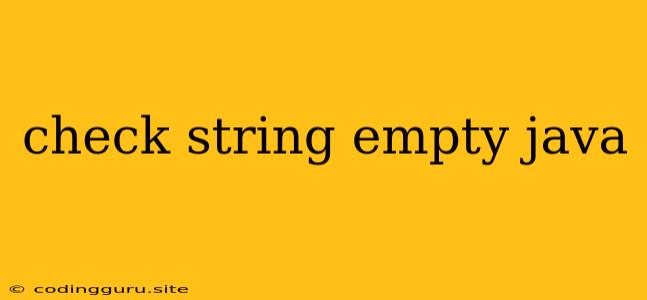Checking for Empty Strings in Java: A Comprehensive Guide
In Java, working with strings is a fundamental aspect of software development. Often, you need to determine if a string is empty, meaning it contains no characters. This is crucial for validating user input, preventing errors, and ensuring proper data handling. This guide will explore various methods for checking if a string is empty in Java, providing you with the knowledge to confidently handle strings in your projects.
Understanding the Essence of Empty Strings
Before diving into specific techniques, let's clarify what constitutes an empty string in Java. An empty string is simply a string that has zero characters. It's represented by an empty pair of double quotes: "".
The isEmpty() Method: The Standard Approach
Java provides a built-in method, isEmpty(), specifically designed to check if a string is empty. This method is highly efficient and considered the best practice for determining emptiness. Let's see an example:
String myString = ""; // An empty string
if (myString.isEmpty()) {
System.out.println("The string is empty.");
} else {
System.out.println("The string is not empty.");
}
This code snippet utilizes the isEmpty() method to check if myString is empty. The output will be: "The string is empty."
The length() Method: A Reliable Alternative
Another approach to check for empty strings involves using the length() method. This method returns the number of characters in the string. If the length is zero, the string is empty.
String myString = ""; // An empty string
if (myString.length() == 0) {
System.out.println("The string is empty.");
} else {
System.out.println("The string is not empty.");
}
The output of this code will be the same as the previous example: "The string is empty."
The equals() Method: Addressing Potential Pitfalls
While isEmpty() and length() are effective, they might not always be sufficient. Consider a scenario where you need to check if a string is empty or contains only whitespace characters. In such cases, you can leverage the equals() method with an empty string.
String myString = " "; // Contains only whitespace characters
if (myString.equals("")) {
System.out.println("The string is empty or contains only whitespace.");
} else {
System.out.println("The string is not empty and contains non-whitespace characters.");
}
This code will print "The string is empty or contains only whitespace." as the equals() method considers the string with only whitespace characters equivalent to an empty string.
Trimming and Comparing: A Comprehensive Approach
To accurately check for strings with only whitespace, you can combine trim() and equals() methods. The trim() method removes leading and trailing whitespace characters from a string.
String myString = " "; // Contains only whitespace characters
if (myString.trim().equals("")) {
System.out.println("The string is empty or contains only whitespace.");
} else {
System.out.println("The string is not empty and contains non-whitespace characters.");
}
This code first trims the whitespace from myString and then checks if the resulting string is equal to an empty string. If it is, the code prints "The string is empty or contains only whitespace."
Best Practices for Choosing the Right Method
-
isEmpty(): Use this method when you only need to know if a string is completely empty (has no characters). It is efficient and widely recommended. -
length(): If you need to know the number of characters in the string and check if it's empty, usinglength()is a valid approach. -
equals()ortrim()withequals(): These methods are useful when you want to account for strings that contain only whitespace characters.
Code Example: Validating User Input
Let's illustrate how these methods can be used in a real-world scenario - validating user input. Imagine you're developing a form where users need to enter their name.
import java.util.Scanner;
public class InputValidation {
public static void main(String[] args) {
Scanner scanner = new Scanner(System.in);
System.out.print("Enter your name: ");
String userName = scanner.nextLine();
if (userName.isEmpty() || userName.trim().equals("")) {
System.out.println("Please enter a valid name.");
} else {
System.out.println("Welcome, " + userName + "!");
}
}
}
This code uses Scanner to get user input. It checks if the entered userName is empty or contains only whitespace characters. If it's not valid, it prompts the user to enter a valid name. Otherwise, it welcomes the user.
Conclusion
Checking for empty strings is a common and crucial task in Java programming. This guide has provided a thorough exploration of different methods and their usage. Remember to choose the most appropriate technique based on your specific requirements. By mastering these methods, you can enhance your Java code, handle string manipulation with precision, and create robust applications that handle user input effectively.
